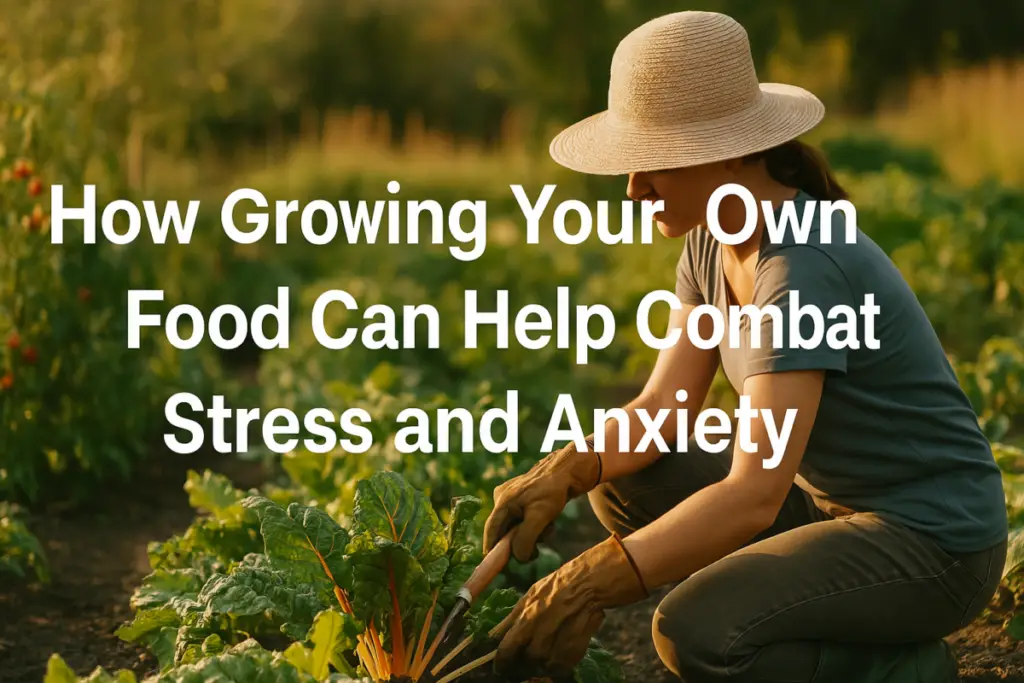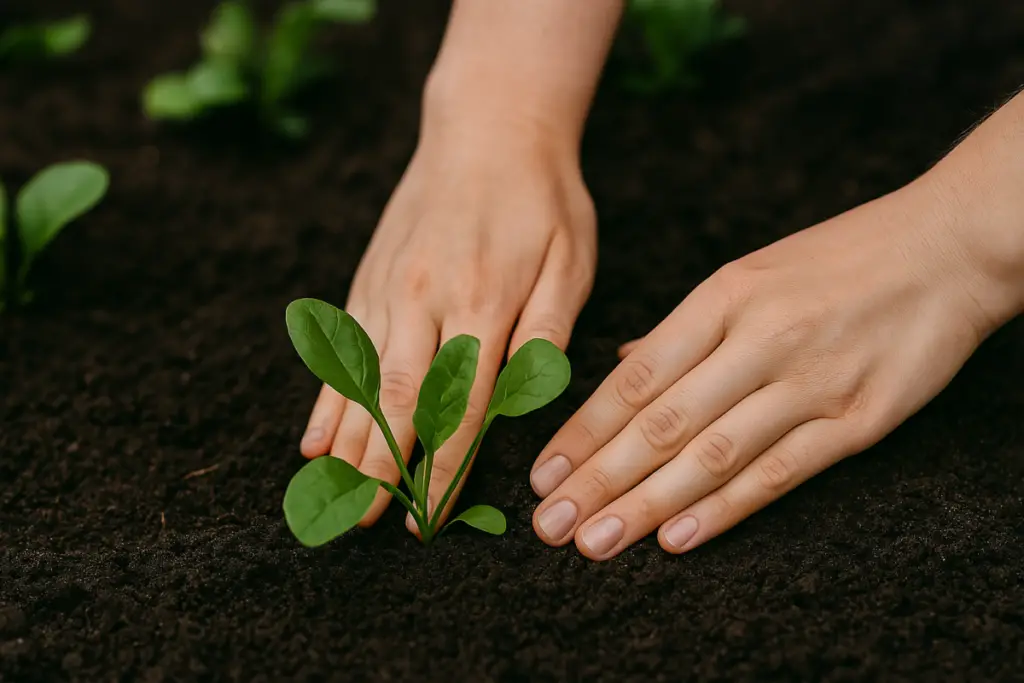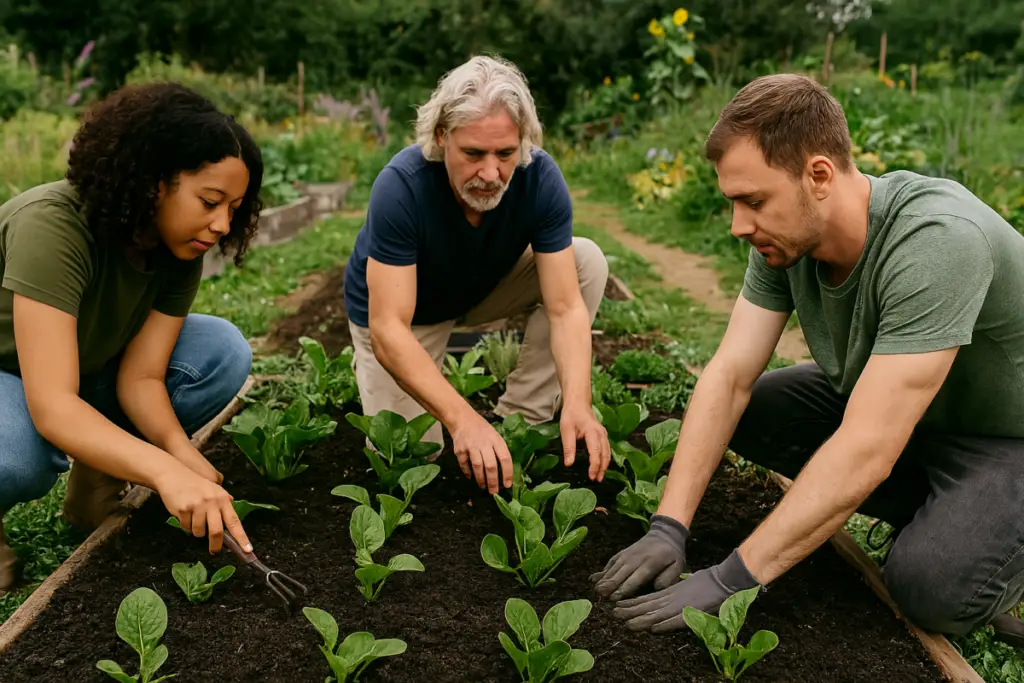
Feeling overwhelmed by modern life? Your garden might just be the therapy you need.
In a world dominated by screens and stress, many people are seeking natural ways to improve their mental well-being. As mental health concerns continue to rise, the search for effective, sustainable stress relief is more important than ever.
One unexpected yet powerful solution lies right in your backyard: gardening. Growing your own food offers not only the satisfaction of self-sufficiency but also a range of psychological benefits. From reducing stress hormones to boosting your mood, cultivating a garden can significantly enhance your mental well-being.
In this article, we’ll explore the science behind gardening’s positive impact on mental health, practical tips for stress-free gardening, and inspiring stories from those who have found solace through cultivating their own green spaces.
By the end, you’ll understand why planting a seed might just be the first step toward a calmer, happier life.
The Science Behind Gardening and Mental Health
How Nature Positively Affects the Brain
Gardening isn’t just about planting seeds and pulling weeds; it’s an immersive experience that profoundly affects mental health. One of the most compelling aspects of gardening is its ability to lower cortisol levels, the stress hormone linked to anxiety and depression. Research published in the Journal of Health Psychology found that gardening significantly reduced cortisol more effectively than indoor activities.
Exposure to greenery has also been linked to increased serotonin production, a key neurotransmitter in regulating mood and reducing feelings of stress. Studies from institutions like the University of Exeter have shown that spending time in natural environments not only boosts mood but also enhances cognitive function.
The Mind-Body Connection in Gardening
Engaging in gardening activities promotes both physical and mental well-being. The repetitive actions of planting, watering, and harvesting help create a sense of calm and rhythm, akin to mindfulness practices. Moreover, physical exertion, whether through digging or raking, releases endorphins, contributing to a natural sense of happiness.
According to the American Horticultural Therapy Association (AHTA), horticultural activities are increasingly being used as therapeutic interventions for those with mental health challenges. The tactile nature of working with soil and plants encourages a deeper connection to the earth, fostering a sense of groundedness and well-being.
Stress-Relieving Aspects of Growing Your Own Food

Mindful Gardening: Being Present in the Moment
Gardening requires focus, whether you’re planting seeds or pruning leaves. This immersion in the present moment is a key element of mindfulness, which has been shown to reduce anxiety and increase emotional stability. As you nurture your plants, your mind shifts from worrying about the past or future to appreciating the simple, grounding act of caring for something living.
Studies conducted by the Mental Health Foundation indicate that mindful gardening can significantly reduce symptoms of anxiety and depression. This practice of being present, combined with gentle physical activity, creates a meditative state that helps alleviate mental tension.
The Satisfaction of Nurturing Life
There’s a profound sense of accomplishment that comes from seeing a tiny seed transform into a thriving plant. This journey not only fosters patience but also builds resilience and a sense of purpose. According to the Royal Horticultural Society, growing your own food can enhance self-esteem and emotional well-being by providing tangible, rewarding outcomes.
In essence, the act of nurturing life through gardening fosters a sense of responsibility and connection, counteracting feelings of helplessness often linked with anxiety.
How Edible Gardening Reduces Anxiety
Taking Control of Your Food Supply
In uncertain times, the ability to grow your own food can be incredibly empowering. Anxiety linked to food security has become more prominent, especially in urban environments. By cultivating a vegetable garden, you are taking direct control of your nourishment, which alleviates the stress associated with dependency on external food sources.
According to the Food and Agriculture Organization (FAO), urban gardening initiatives not only enhance community resilience but also improve mental well-being by fostering self-reliance.
Physical Connection to Nature
One fascinating aspect of gardening is the way soil microbes interact with our bodies. A specific bacterium, Mycobacterium vaccae, commonly found in garden soil, has been shown to trigger the release of serotonin when inhaled or ingested, promoting a natural antidepressant effect. This microbial interaction highlights the profound mental health benefits of engaging directly with the earth.
A study published in Frontiers in Psychology suggests that regular exposure to soil microbes may play a role in reducing symptoms of stress and enhancing overall well-being. This discovery reinforces the idea that edible gardening is not just about food but also about cultivating a healthier state of mind.
Additionally, the sensory experience of working with plants – the feel of the soil, the smell of fresh herbs, and the visual reward of vibrant vegetables – stimulates multiple senses simultaneously. This multisensory engagement helps ground the mind, promoting relaxation and reducing anxiety.
Moreover, knowing that your efforts result in tangible, nourishing outcomes contributes to a sense of accomplishment. The repetitive and rhythmic tasks involved in gardening can serve as a form of active meditation, allowing thoughts to settle while the hands remain engaged. This therapeutic process can become a reliable routine for managing stress and finding inner peace.
Practical Tips for a Stress-Free Gardening Experience
Start Small to Prevent Overwhelm
One of the most common mistakes new gardeners make is starting too big. Choose low-maintenance crops like lettuce, herbs, or cherry tomatoes, especially if you’re new to gardening. These plants are resilient and require minimal care, making them ideal for stress-free gardening.
Create a Routine That Feels Like Self-Care
Integrate gardening into your daily routine without making it feel like a chore. Dedicate just 10–15 minutes a day to watering, pruning, or simply observing your plants. This regular, gentle activity can help build a sense of routine and comfort, promoting mental clarity and calmness.
Best Plants for Mood-Boosting Gardens
Easy-to-Grow Herbs for Stress Relief
Herbs like lavender, chamomile, and lemon balm are known for their calming properties. Lavender, in particular, has been shown to reduce stress levels when inhaled, while chamomile and lemon balm can be used in teas to help ease anxiety and promote relaxation.
Bright and Cheerful Vegetables
Incorporating colorful vegetables like sunflowers, cherry tomatoes, and rainbow chard into your garden not only adds visual appeal but also uplifts your mood. Studies suggest that bright colors can positively impact mental well-being, making your garden not just productive but also emotionally uplifting.
Real-Life Stories: Gardeners Who Found Peace
Case Study 1: An Urban Professional’s Balcony Garden
Amid the chaos of city life, one urban professional found peace through a small balcony garden. Initially overwhelmed by work stress and long hours indoors, she decided to grow a few herbs and flowers on her apartment balcony. What started as a small project soon became a sanctuary.
Every morning, she spent just 15 minutes watering her plants, gently brushing the leaves, and inhaling the fresh scents of basil and mint. The routine became a meditative practice, offering a sense of calm and purpose before starting the day. As the plants flourished, so did her sense of well-being. “It’s like a little piece of nature right in the middle of the city,” she shared.
Over time, the balcony garden became more than just a hobby. It evolved into a therapeutic space where she could disconnect from work and reconnect with herself. The act of nurturing her plants cultivated a deeper sense of resilience and mindfulness. She noticed improvements in her mood and a decrease in anxiety, proving that even a small garden can have a significant impact on mental health.
Case Study 2: A Family’s Backyard Food Oasis
During challenging times, one family turned their backyard into a thriving food oasis. The family of four decided to grow their own vegetables to save money and reduce trips to the grocery store. What they didn’t expect was how the gardening process would positively affect their mental well-being.
The entire family got involved, from planning the garden layout to planting seeds and harvesting crops. The shared activity strengthened family bonds and provided a much-needed break from screens and stress. They planted tomatoes, zucchinis, peppers, and leafy greens, transforming the once-unused space into a productive, calming retreat.
One family member noted, “It wasn’t just about the food; it was about working together and seeing something grow because of our efforts.” As the garden flourished, so did their sense of unity and purpose. The backyard oasis became a place of relaxation and pride, giving them a collective sense of accomplishment and well-being.
Case Study 3: A Community Garden that Healed a Neighborhood
In an urban neighborhood plagued by isolation and stress, a community garden project brought residents together. Spearheaded by a local volunteer group, the garden transformed a vacant lot into a vibrant space where people could grow food, flowers, and friendships.
Residents reported that working in the garden improved their mood and reduced feelings of loneliness. Sharing gardening tips, swapping produce, and collaborating on planting decisions fostered a sense of belonging and cooperation. One volunteer shared, “We didn’t just grow food here; we grew a community. It made us feel like we were part of something bigger than ourselves.”
The garden not only became a food source but also a mental health resource, giving people a reason to come together, share stories, and find solace in nature. Over time, the sense of pride in maintaining the garden extended to caring for the neighborhood itself, creating a more positive and connected community.
Creating a Calming Garden Space
Designing for Tranquility
To create a garden space that soothes the mind, focus on incorporating natural elements that evoke calmness. Start with soft, flowing plants like ferns, lavender, and ornamental grasses that sway gently in the breeze. Integrate water features like small fountains or bird baths to add soothing sounds and a sense of movement.
Arrange your garden with seating areas where you can unwind and observe your plants. Choose comfortable, weather-resistant furniture that invites relaxation. Adding gravel paths or stepping stones not only guides the flow of the space but also introduces a tactile element that enhances the sensory experience.
Use of Sound and Texture
Sound can play a crucial role in creating a calming garden environment. Consider hanging wind chimes or adding plants like bamboo that rustle in the wind. Texture is equally important—mix plants with smooth, velvety leaves like lamb’s ear with coarser, textured foliage like hostas to create a visually and tactilely rich environment.
Creating intentional spaces where you can pause, breathe, and connect with nature enhances the therapeutic benefits of gardening. Whether your space is large or small, thoughtful design choices can transform it into a personal oasis of tranquility.
Gardening as a Community Activity

How Community Gardens Foster Social Connections
Gardening can be a solo hobby, but it also thrives as a community activity. Community gardens offer a space where neighbors come together, share resources, and support each other in cultivating healthy produce. Studies have shown that participating in community gardening can reduce feelings of isolation and promote a sense of belonging.
Volunteering in Urban Gardens
Urban community gardens often rely on volunteers for maintenance and development. Contributing to these spaces not only helps the garden flourish but also provides a sense of purpose. Whether you’re helping with weeding, planting, or building garden beds, your involvement creates a positive impact on both your mental health and the community as a whole.
The collaborative nature of community gardening fosters social bonds, reducing feelings of loneliness and offering a support network. Regular participation can boost mood, enhance self-esteem, and create a shared sense of accomplishment.
Frequently Asked Questions
1. Can gardening really help reduce stress and anxiety?
Yes, gardening has been shown to reduce stress by lowering cortisol levels and increasing serotonin production. The combination of physical activity, mindfulness, and a connection with nature contributes to an overall sense of well-being.
2. What are some easy-to-grow plants that can boost my mood?
Herbs like lavender, chamomile, and lemon balm are known for their calming properties. Bright and colorful vegetables like cherry tomatoes, rainbow chard, and sunflowers also add a cheerful touch to your garden, positively impacting your mood.
3. How much time do I need to spend gardening to see mental health benefits?
Even just 10–15 minutes a day can make a difference. The key is consistency and mindfulness. Small, regular tasks like watering, pruning, or simply observing your plants can help create a sense of routine and relaxation.
4. Are community gardens beneficial for mental health?
Absolutely! Community gardens not only provide a space for growing food but also foster social connections. Being part of a gardening community can reduce loneliness, build social bonds, and offer a support network.
5. What if I don’t have a garden space at home?
You can still experience the benefits by creating a small indoor garden or participating in a community gardening project. Container gardening on balconies or windowsills can also provide a therapeutic escape.
6. Can gardening help with more severe mental health conditions?
While gardening is not a substitute for professional mental health treatment, it can be a valuable complementary activity. Many therapeutic programs incorporate horticulture as a way to support mental well-being. Always consult a mental health professional for tailored advice.
Final Thoughts: Cultivating a Healthier Mind through Gardening
Gardening isn’t just about growing food; it’s about growing a healthier, more balanced life. The act of nurturing plants can nurture your mental well-being, helping you find calm and purpose in the simplicity of nature. Whether you’re planting a single herb on your windowsill or cultivating a full garden, the benefits extend far beyond the physical.
By dedicating time to growing your own food, you invest not just in fresh produce but in your mental resilience. The connection to the earth, the satisfaction of watching plants thrive, and the mindful routine of gardening all contribute to a more peaceful and centered life. Embrace the therapeutic power of gardening and discover how it can be your path to stress relief and holistic wellness.
Gardening isn’t just about growing food; it’s about growing a healthier, more balanced life. The act of nurturing plants can nurture your mental well-being, helping you find calm and purpose in the simplicity of nature. Whether you’re planting a single herb on your windowsill or cultivating a full garden, the benefits extend far beyond the physical.
By dedicating time to growing your own food, you invest not just in fresh produce but in your mental resilience. The connection to the earth, the satisfaction of watching plants thrive, and the mindful routine of gardening all contribute to a more peaceful and centered life. Embrace the therapeutic power of gardening and discover how it can be your path to stress relief and holistic wellness.

